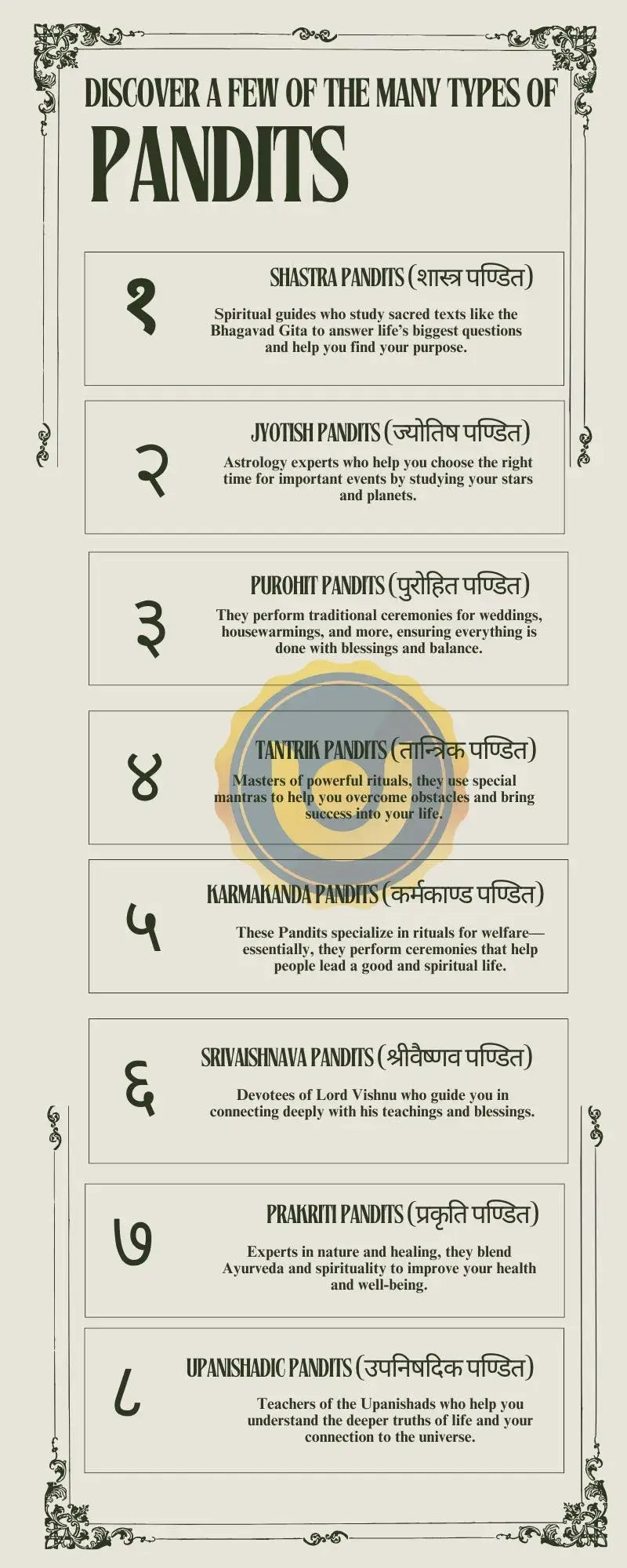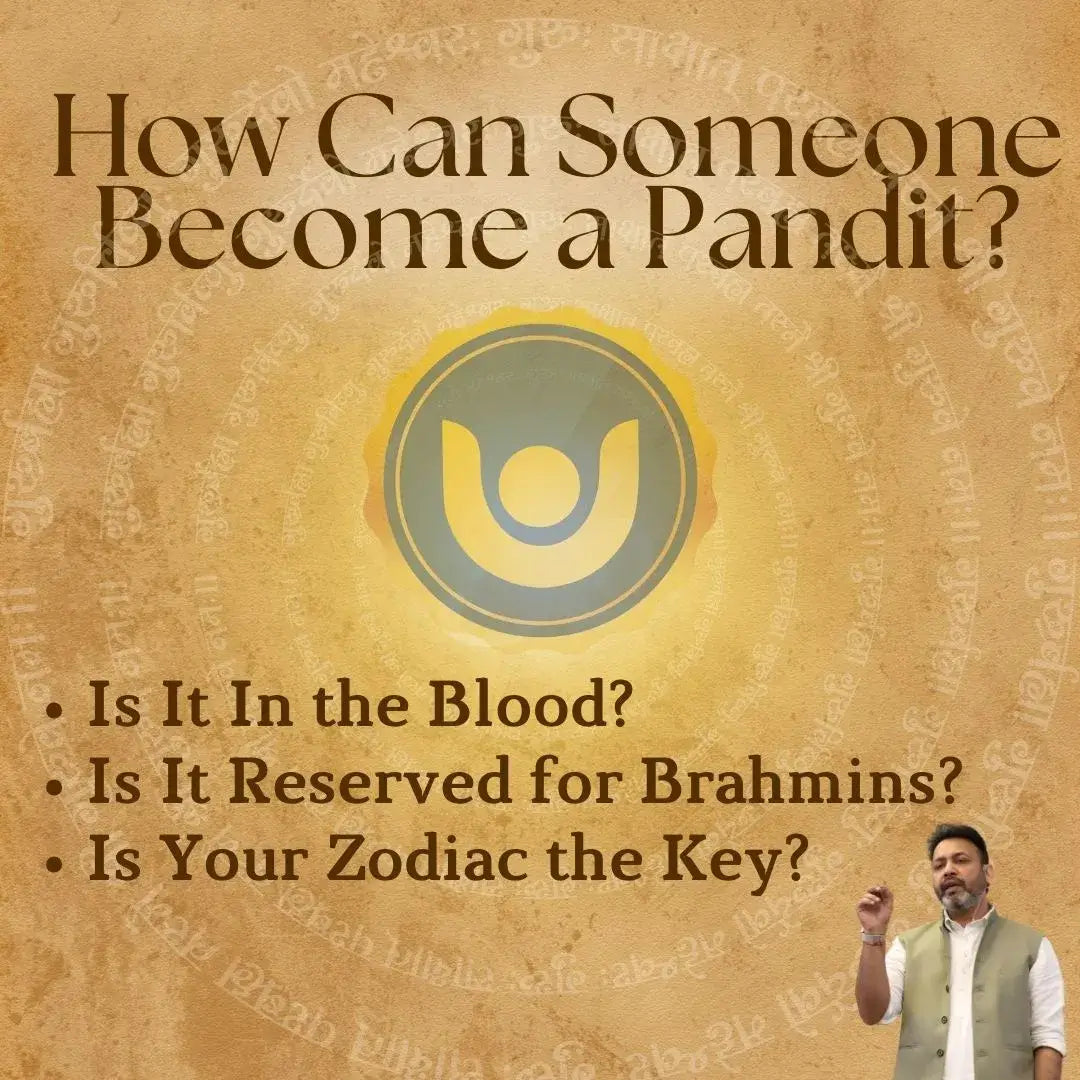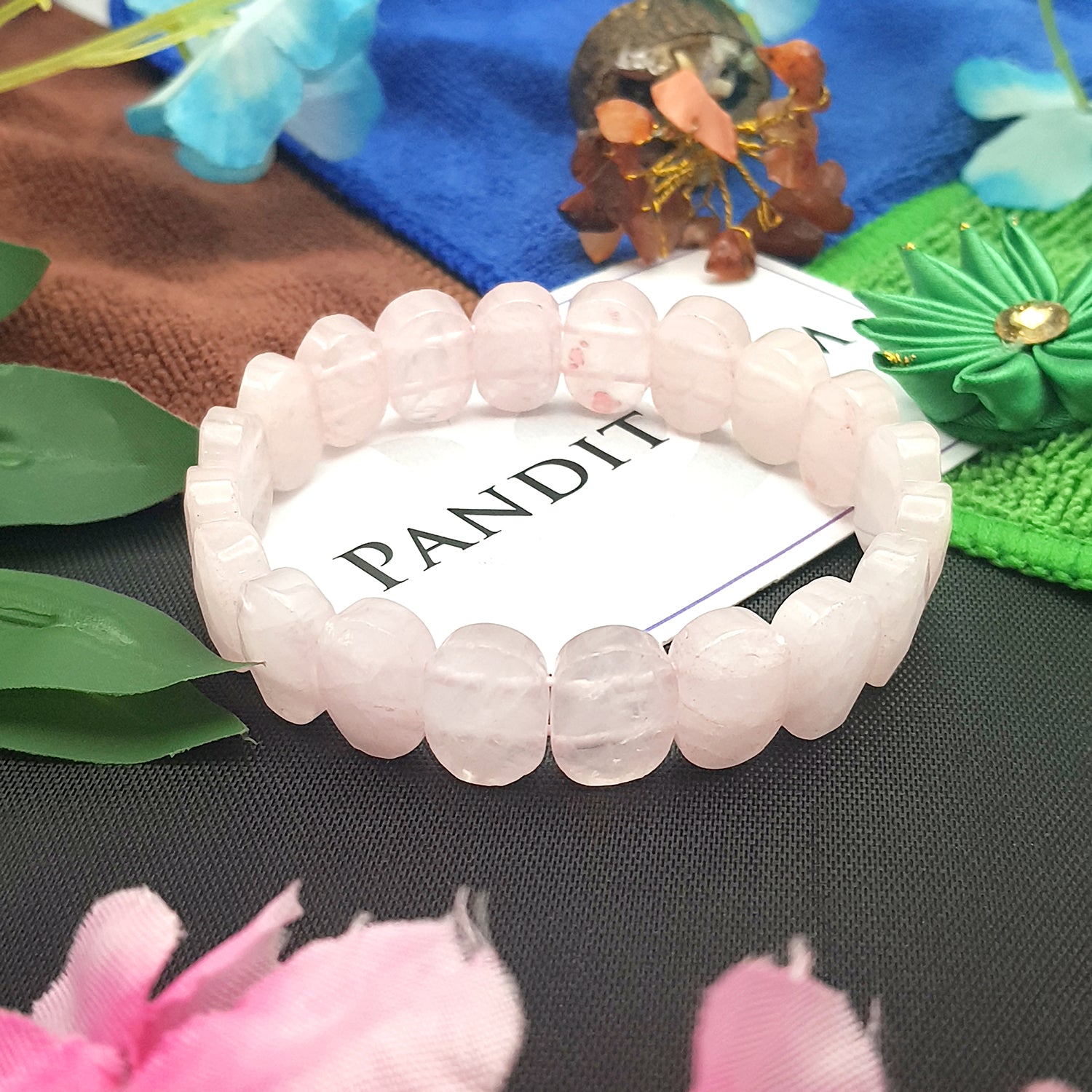Many people confuse the terms pandit, purohit, pujari, and guru, often using them interchangeably. However, this is incorrect. Each of these terms refers to different roles, with distinct functions based on their inherent traits.
In this blog, you’ll learn about the differences between pandits, purohits, pujaris, and gurus.
The Origin and Meaning of the Term "Pandit"
Before understanding who a pandit is, it’s important to know the origin of the term. The word pandit is derived from panda, which means wisdom. Thus, a pandit is someone who uses their intellect and wisdom to provide logical solutions and guidance.
Renowned Pandits in Indian Mythological History

The pandits who have been famous in Indian mythology, are famous for their wisdom, quick thinking and innovative ideas to modern problems. Here are some of the examples:
- Sage Vashistha: Known for his profound wisdom, he authored the Yoga Vashistha, a philosophical text on Vedanta. He also guided Lord Rama and played a pivotal role in shaping his life.
- Sage Vishwamitra: He composed significant portions of the Rigveda and created the Gayatri Mantra, a powerful Vedic chant.
- Acharya Drona (Guru Dronacharya): Trained the Pandavas and Kauravas in the art of warfare and archery, shaping the events of the Mahabharata.
- Chanakya (Kautilya): Contribution: Known for authoring the Arthashastra, an ancient Indian treatise on statecraft, economics, and military strategy.
- Sage Parashara: Authored the Brihat Parashara Hora Shastra, a foundational text in Vedic astrology, and was the grandfather of Sage Vyasa.
- Sage Vyasa (Veda Vyasa): Divided the Vedas into four parts (Rigveda, Yajurveda, Samaveda, and Atharvaveda) and wrote the epic Mahabharata, including the Bhagavad Gita.
- Sage Agastya: Known for his contributions to the Rigveda and his significant role in spreading Vedic knowledge to the southern regions of India.
- Sage Bharadwaja: Authored the Bharadwaja Samhita, a significant text on Ayurveda and engineering, and contributed to the Rigveda.
- Sage Yajnavalkya: Known for his teachings in the Brihadaranyaka Upanishad, particularly on the nature of Atman (soul) and Brahman (ultimate reality).
- Sage Patanjali: Compiled the Yoga Sutras, laying the foundation for the philosophical practice of yoga.
What Are Some Types of Pandits and Their Roles?

Shastra Pandits (शास्त्र पण्डित)
Okay, time for some real talk. Ever wondered about life’s BIG questions — Who am I? Why am I here? It’s almost like seeking the ultimate truth, right? Well, Shastra Pandits are the philosophers who dive into texts like the Bhagavad Gita and the Upanishads to answer these very questions.
If you’ve ever felt the urge to understand your purpose on this earth, a Shastra Pandit would be your guide to the answers. Imagine attending one of their lectures—you’d walk out feeling like your soul had just leveled up!
Jyotish Pandits (ज्योतिष पण्डित)
Let’s flip the script a little. Have you ever asked yourself, “Is now the right time to take the plunge?” Whether it’s starting a business or even getting married, timing can be EVERYTHING.
This is where a Jyotish Pandit comes into play. These aren’t just astrologers; they are like cosmic timekeepers.
Purohit Pandits (पुरोहित पण्डित)
Let’s take a moment—think back to your last family celebration — a wedding, maybe a housewarming? Now, did you feel like everything went smoothly, almost like magic? That magic was most likely created by a Purohit Pandit.
These are the Pandits who weave the threads of tradition during important life events. Whether it’s guiding you through a wedding ceremony or conducting a shraadh to honor ancestors, these Pandits hold the power to keep your spiritual balance intact.
Tantrik Pandits (तान्त्रिक पण्डित)
Now, let’s venture into the mysterious world of Tantra — ever heard of someone performing rituals that almost seem like spiritual magic? That’s where the Tantrik Pandits come in.
They don’t just chant—they invoke powerful deities using mantras to bring about desired changes. Powerful stuff, right? These Pandits are experts in the unseen, helping people unlock new dimensions of success and protection. Ever wondered if there’s a deeper spiritual layer to success? Maybe Tantra could hold the key.
Karmakanda Pandits (कर्मकाण्ड पण्डित)
Let’s get practical for a second. Life is full of events, right? Births, weddings, and even the tough moments like funerals. What’s crucial is that each of these events holds a deeper spiritual meaning, and that’s where the Karmakanda Pandits shine.
They perform life rituals — everything from pujas to yajnas—ensuring that you receive blessings for a prosperous and harmonious life.
Srivaishnava Pandits (श्रीवैष्णव पण्डित)
Here’s a question: When was the last time you felt completely connected to Lord Vishnu? Srivaishnava Pandits specialize in this divine connection. They live and breathe Vishnu’s teachings, focusing on texts like the Vishnu Purana.
Prakriti Pandits (प्रकृति पण्डित)
You know, nature has always been deeply intertwined with spirituality, right? From Ayurveda to ancient medicinal practices, Prakriti Pandits are the ones who study the natural world and its connection to your well-being.
When you think of these Pandits, think of them as the wise healers, blending nature with spirituality. How often do we overlook the natural world around us in our spiritual journey? Maybe it’s time to look closer.
Upanishadic Pandits (उपनिषदिक पण्डित)
Alright, let’s dive into the ultimate truth—the Upanishads. These texts aren’t just scriptures; they’re the key to understanding the deepest spiritual realities. Upanishadic Pandits are the masters of these teachings, and they guide seekers to self-realization. Take Shankaracharya, for example—his teachings on Advaita Vedanta still resonate with millions.
He made us understand that everything is connected to the Divine, and that we are, in essence, one. Ever felt like you were on the edge of understanding the true nature of reality? These Pandits hold the answer, and it’s closer than you think.
Why Were Pandits Seen as a Challenge to Mughal Power?
The Mughals, especially during Aurangzeb’s reign, really saw the Pandit community as a challenge. Think about it—Pandits were not just scholars, they were the heart of Hindu culture, holding onto ancient knowledge and guiding people through religious rituals and moral teachings. They played a huge role in keeping the traditions alive, and their influence stretched far beyond just the temples; they advised kings and shaped the community.
For the Mughals, this was a problem because it stood in the way of their control. Pandits weren’t afraid to stand up against forced conversions, and they had a way of keeping Hinduism strong and united. Plus, the wealth that temples managed under the Pandits' guidance was something the Mughals wanted to seize. By targeting them, they believed they could weaken the core of Hindu society and make it easier to rule. It’s crazy to think how a community known for its wisdom and peaceful contributions could be seen as such a threat, right?

What Are the Myths Spread About Pandits? Busting Common Misconceptions
Myth 1: Pandits are just priests who perform rituals and pujas.
Fact: Sure, many Pandits are involved in rituals, but they’re not just priests. They’re actually scholars who dive deep into Vedic knowledge, astrology, philosophy, and even law. They’re all about using their wisdom and intellect to guide you, not just lead pujas.
Myth 2: Pandits are only associated with Hinduism.
Fact: Nope! The title Pandit isn’t exclusive to Hinduism. It’s a term used for people who are experts in ancient Indian texts and teachings. You’ll find Pandits in other spiritual traditions too, like Jainism, Buddhism, and even Sikhism. It’s about wisdom, not just religion.
Myth 3: Pandits can only come from certain castes or communities.
Fact: This is a huge misconception. While Pandits historically came from Brahmin families, the role isn’t tied to caste anymore. Nowadays, anyone with dedication and a thirst for knowledge can become a Pandit—no caste restrictions!
Myth 4: Pandits are always men.
Fact: This one’s outdated! While Pandits were mostly men in the past, women are stepping up too. More and more women are becoming well-versed in sacred texts, rituals, and spiritual wisdom. The role of a Pandit is open to anyone with the right knowledge and passion.
Myth 5: Pandits are fortune-tellers who can predict the future with absolute certainty.
Fact: Pandits can offer insights into your future, but they’re not all about predicting with certainty. They use astrology and spiritual wisdom to guide you on how to align yourself with the universe. It's more about helping you make the right choices than telling you exactly what will happen.
Myth 6: Pandits are rich and live a lavish lifestyle.
Fact: Actually, most Pandits lead pretty simple lives. Sure, some might earn a living from their services, but their focus is on knowledge, spirituality, and helping others. They’re not chasing wealth—spiritual growth and service are their priorities.
Myth 7: Pandits can only perform rituals for specific people or families.
Fact: Pandits are not bound to specific families or individuals. They offer guidance and perform rituals for anyone who seeks their wisdom, regardless of their background. Their role is to serve anyone in need of spiritual support, not just those from particular families.
Myth 8: Pandits have to be older to be respected or trusted.
Fact: While experience is important, age isn’t the deciding factor in a Pandit’s wisdom. A young Pandit who has studied deeply can be just as knowledgeable and trusted as someone older. It's all about learning and spiritual growth, not the years on the clock.
Myth 9: Pandits only study Sanskrit and can’t understand modern languages.
Fact: While Sanskrit is an essential part of their training, many Pandits are also well-versed in modern languages and understand how to communicate with people from all walks of life. They bridge the gap between ancient texts and contemporary concerns, making their teachings accessible to everyone.
Myth 10: Pandits live isolated lives and have no social interactions.
Fact: Far from it! Many Pandits are active members of their communities. They interact with people, guide them through life’s challenges, and even engage in social and educational initiatives. They aren’t just locked away in study—they’re deeply involved in the lives of those they help.
Myth 11: Pandits must have an extremely rigid and strict lifestyle.
Fact: While Pandits do lead disciplined lives, they don’t follow a strict, rigid routine all the time. Like anyone else, they balance their work, learning, and personal lives. The focus is on discipline in knowledge and actions, but they are not living in isolation or extreme asceticism.
Myth 12: Pandits can only perform ancient rituals that no longer have relevance today.
Fact: Pandits are not stuck in the past. They adapt their teachings and rituals to remain relevant in the modern world. Whether it’s offering spiritual guidance, solving modern-day problems, or guiding people through personal crises, their wisdom is timeless, but they are far from outdated.
Myth 13: Pandits always wear traditional attire and never modern clothes.
Fact: While it’s common for Pandits to wear traditional attire for rituals or spiritual events, they wear modern clothes just like anyone else when the occasion calls for it. Being a Pandit isn’t about how you dress; it’s about the wisdom and knowledge you hold within.
Myth 14: Pandits don’t have families or relationships.
Fact: Many Pandits have families, and their role as a spiritual guide doesn’t mean they must renounce all personal connections. They can have loving relationships, raise families, and still provide wisdom to others. Their personal life and their professional role as a guide can coexist harmoniously.
How Can Someone Become a Pandit?

You’ve probably heard a lot of talk about Pandits, but how does one actually become one? Is it about birth, caste, or even your astrological sign? Let’s break it down and bust some myths along the way!
1. By Birth – Is It In the Blood?
So, the first thing you might think is that Pandits are born into it, right? And you wouldn’t be wrong—traditionally, many Pandits came from families where spiritual knowledge and sacred rituals were passed down from generation to generation. Being born into a Pandit family definitely gave someone a head start. But here’s the catch: birth alone doesn’t make you a Pandit. You still need to dedicate yourself to learning, wisdom, and spiritual practice. So, while family history might help, it’s the knowledge you gain that truly matters.
2. By Caste – Is It Reserved for Brahmins?
Here’s another common belief: Pandits are only from the Brahmin caste. Yep, in the past, that was largely the case, as Brahmins were often the keepers of religious knowledge and rituals. But guess what? Times have changed! Nowadays, anyone can become a Pandit. It’s all about how much you study, how much wisdom you gain, and how deeply you connect with your spiritual path. Caste doesn’t limit anyone’s potential to become a Pandit. Anyone with dedication and the thirst for knowledge can claim the title.
3. As Per Sun Sign – Is Your Zodiac the Key?
Now, here’s a fun one: Can your sun sign make you a Pandit? Some folks believe that the stars have a say in whether you can become a Pandit. For example, certain zodiac signs are thought to be more aligned with spiritual knowledge. But here’s the truth: while your astrological chart can certainly offer insights into your strengths and spiritual inclinations, it’s not the sun sign that makes you a Pandit. It’s your personal commitment to study, wisdom, and your ability to guide others that truly defines the role.
FAQs
Are Pandits and Brahmins the same?

Great question! While Pandits and Brahmins are often linked, they’re not exactly the same. A Brahmin is a person from the Brahmin caste, which has traditionally been associated with priests, scholars, and religious leaders in Hindu society. So, many Pandits have historically come from Brahmin families. But here’s the twist: anyone, not just Brahmins, can be a Pandit. The term Pandit refers to someone who is highly knowledgeable, especially in spiritual or religious matters, and it's not limited to caste.
In short, a Brahmin can be a Pandit, but not all Pandits are Brahmins. It’s all about wisdom, study, and devotion to learning—caste doesn’t hold the power it once did when it comes to who can take on the title of Pandit. Does that clear it up?
What are the top 10 pandit castes?
Sharma
This one’s pretty common! You’ll find Sharma in places like northern and central India, and it’s associated with Brahmins who are often priests or scholars.
Pandey
A popular surname in Uttar Pradesh, Bihar, and Madhya Pradesh, Pandey is typically used by Brahmins involved in religious practices and teaching.
Tripathi
If you’re from northern India, you’ve probably heard of Tripathi. It’s a surname that signifies a scholar well-versed in the three Vedas. You’ll see this name often in places like Uttar Pradesh and Bihar.
Joshi
Joshi is common in Maharashtra, Gujarat, and North India. These Pandits often take on roles as astrologers or Vedic scholars, so they’re pretty knowledgeable!
Tiwari
Tiwari is another surname you’ll encounter in Uttar Pradesh and Bihar. They’re typically learned in the scriptures and actively participate in religious rituals.
Bhat
Found mostly in Jammu and Kashmir, Bhat is a name tied to scholars and priests. Many of them have deep knowledge of religious practices and texts.
Chaturvedi
If someone’s surname is Chaturvedi, it usually means they’re a scholar of all four Vedas. This one’s found mostly in northern India.
Mishra
Mishra is a common surname in places like Uttar Pradesh and Bihar, and it’s associated with those who are deeply knowledgeable in religious and philosophical teachings.
Vyas
Vyas is a name linked to the famous sage Vyasa, who compiled the Vedas. This surname is often found in places like Uttar Pradesh and Madhya Pradesh.
Upadhyay
Common in Bihar, Uttar Pradesh, and Nepal, Upadhyay usually refers to someone who teaches religious knowledge or is a spiritual guide.
Why do Kashmiri Pandits eat meat?

So, you might be wondering—why do Kashmiri Pandits eat meat, right? It’s definitely a bit surprising because many people associate Brahmins with vegetarian diets. But the thing is, Kashmiri Pandits have a different cultural and historical background.
Living in the mountainous regions of Kashmir, where food wasn’t always easy to come by, they adapted to what was available. Meat, especially lamb and goat, became a staple in their diet. Over time, it became a key part of their rich culinary traditions—think dishes like Rogan Josh and Yakhni.
For Kashmiri Pandits, eating meat isn't seen as going against their spiritual beliefs. They maintain a balance between physical and spiritual well-being, and many believe it’s fine to eat meat in moderation, especially during festivals or family gatherings. So, it’s more about adapting to their environment and keeping up with their unique traditions than rejecting any core values. Pretty interesting, right?
Why do Pandits not eat onions?
So, why don’t some Pandits eat onions? It actually has to do with their spiritual practices. Many Pandits follow something called a sattvic diet, which is all about eating pure, clean foods that help maintain mental clarity and peace. Foods like fruits, veggies, dairy, and grains are the focus because they’re believed to promote calm and higher consciousness.
Onions, along with garlic, are considered tamasic or rajasic. These terms basically mean they can make you feel sluggish or too energetic, which can interfere with things like meditation and staying focused spiritually. So, it’s not about avoiding onions for health reasons, but more about keeping the mind and body in a state that’s ideal for spiritual growth.
That said, not all Pandits follow this strictly, and some might include onions in their meals. It really depends on personal choice and family traditions! Does that make sense?
Why do Pandits often keep a particular hairstyle, like a Topknot or Jatay?

So, the distinctive hairstyle many Pandits wear, like the topknot or jatay, actually has a lot of spiritual meaning. It’s tied to religious practices and is often seen as a symbol of brahmacharya—a life of discipline, focus, and spiritual learning. The hairstyle is a reminder of their commitment to those values.
Also, the little knot of hair is often placed at the top of the head, which is considered the crown, symbolizing a connection to higher consciousness and the divine. It’s like a physical sign of spiritual energy!
Different families might have their own traditions, but generally, it’s all about devotion and staying focused on wisdom and spirituality. Pretty fascinating how something like a hairstyle can carry so much significance, right?
What are some things Pandits are not supposed to do?
- Never eat food from others
- Avoid non-vegetarian food
- Avoid alcohol and intoxicants
- Refrain from lying or speaking ill of others
- Never engage in dishonest or unethical activities
- Avoid worldly distractions
- Refrain from committing acts of violence




























